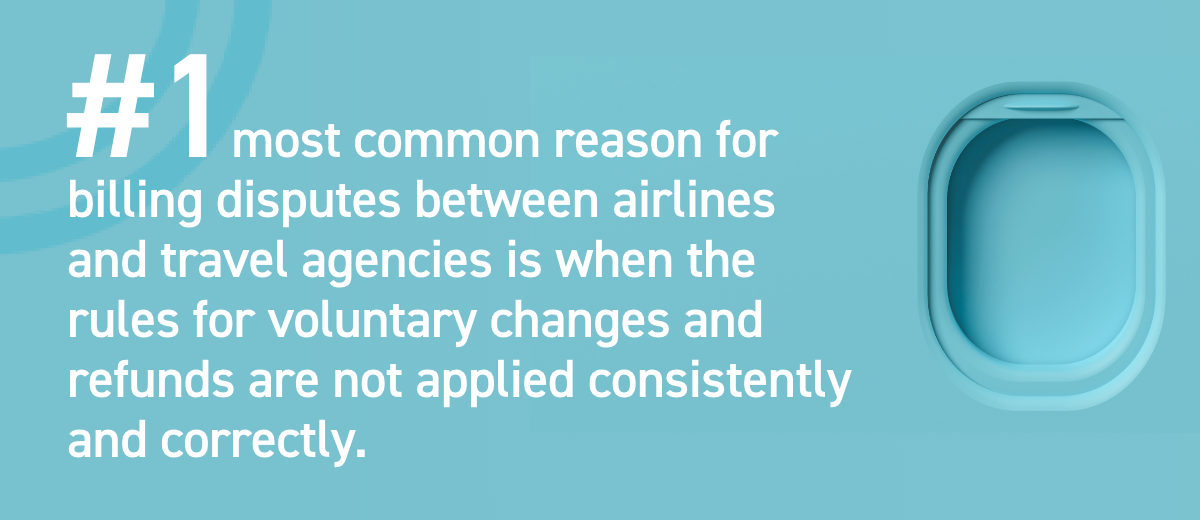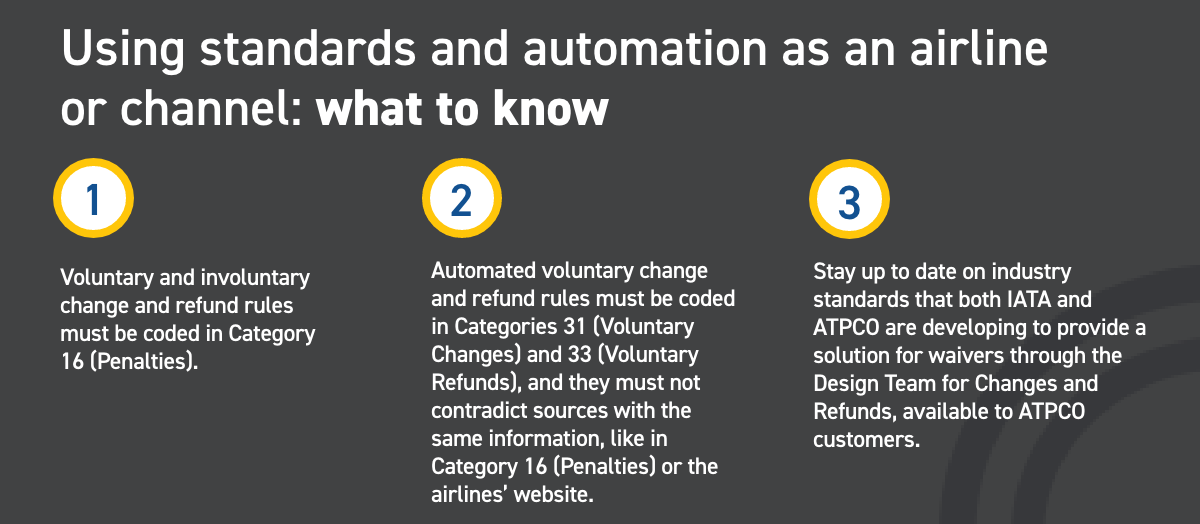
When travel plans change for passengers, airlines take pride in helping those travelers find new routes to get to their destination, provide a quick and easy refund, or help to re-plan their travel. So how do 400+ airlines communicate each of their individual change policies to over 100,000 points of sale to ensure seamless passenger servicing? Through ATPCO, which sends the policy information around the globe as the data that allows automated pricing and retailing.
The most common reason for billing disputes between airlines and travel agencies is when the rules for voluntary changes and refunds are not applied consistently and correctly. We can fix that. Existing standards and technology can help get passenger servicing responses (the policies) out to the marketplace quickly, and they make back office processes consistent to minimize the chance of disputes, so everyone can focus on selling the best products to passengers.
Consistent communication of policies is critical when plans change. When a passenger purchases a travel product (typically a ticket) from an airline or travel agency, the contract of carriage determines the rules that will apply from the time of purchase until the final service is delivered. This detailed information gives the traveler transparency into the conditions for the product they bought.
Sometimes things change. This might be because of natural events such as weather or a pandemic; an issue with delivering the service because a plane is being maintained; or simply that life happens, and even the best-laid plans don’t work out.
 In these cases, whether change is driven by the traveler (voluntary) or the airline (involuntary), a robust set of policy information is crucial. The stress of change can be better managed and facilitated when everyone knows what to do in all circumstances. These policies can be found on an airline’s website, on the ticket, or at the travel agency where the purchase took place.
In these cases, whether change is driven by the traveler (voluntary) or the airline (involuntary), a robust set of policy information is crucial. The stress of change can be better managed and facilitated when everyone knows what to do in all circumstances. These policies can be found on an airline’s website, on the ticket, or at the travel agency where the purchase took place.
But how do these policies get to all these places, and how do we make sure each place has the same information? Automation. ATPCO has long developed ways to codify these policies into consistent data and standards to answer every eventuality. The airlines create their policies, and ATPCO distributes that data to everyone who needs it.
Take a look at the three most common standards dealing with changes: Category 16 (Penalties), Category 31 (Voluntary Changes), and Category 33 (Voluntary Refunds).
So…what’s next? As an airline industry standards platform and airline-owned product innovator, ATPCO strives to improve data content and standards for distribution to all channels. We invite you to join us if you want to participate in some of the important areas ATPCO is working on with the industry:
- Allowing more flexibility around the length of time a travel document is valid
- Defining an end-to-end process for voucher issuance in voluntary change and refund situations
- Giving an option to passengers to take an incentive for a travel credit instead of a refund
- Automating the waivers process so that it can be consistently communicated across all channels
- Providing an industry standard for involuntary changes and refunds, also known as irregular operations

The challenges that airline policies for changes and refunds persist; airlines are constantly working to keep their policies up to date and adaptable to significant changes in the market. 2020 illuminated this tricky balance more than ever.
ATPCO exists to support and constantly improve the distribution of air travel pricing and retailing data, like airline policies, and we are pushing ahead so we can serve our customers, and ultimately passengers, globally. Stay informed about what we’re working on by signing up for our newsletter, The Foundation.


